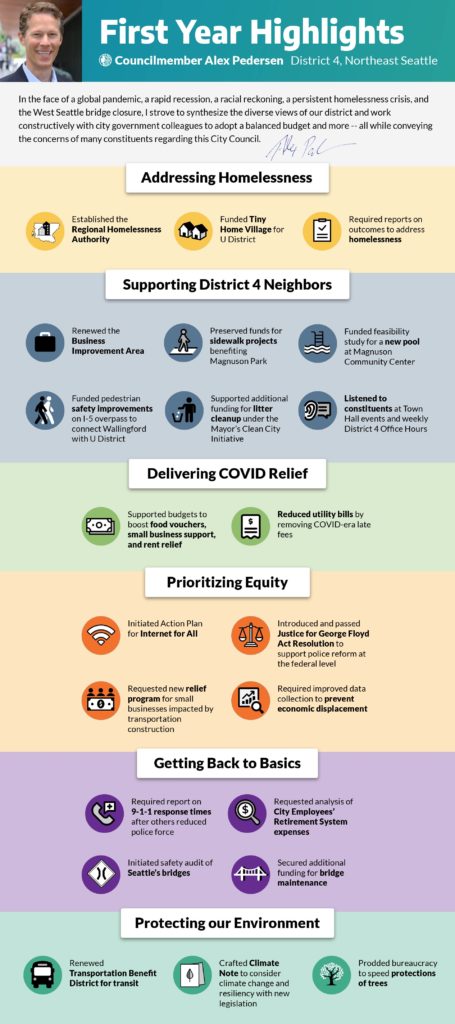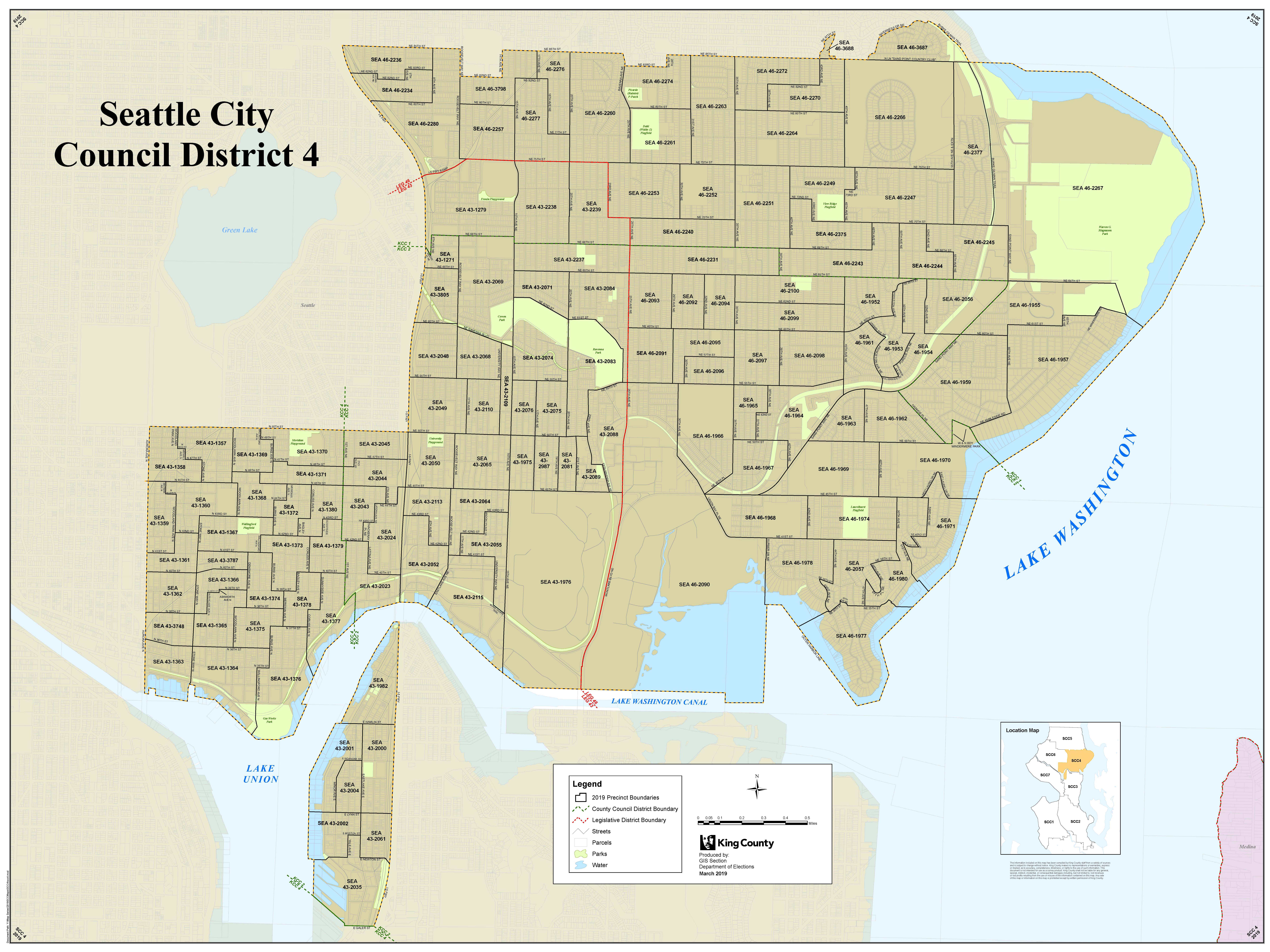First Year Highlights for Our District 4
Friends and Neighbors,
I hope this final newsletter for 2020 finds you and your loved ones safe and healthy during the winter holidays — and hanging on — as we finally see the light at the end of the long tunnel with the COVID pandemic. It’s hard to believe we’ve already finished my first year as your City Councilmember for District 4 — and what a year to serve! 2020 was full of unprecedented challenges: a global pandemic, a rapid recession, a racial reckoning, the persistent homelessness crisis, the West Seattle bridge closure, and an antagonistic Trump administration. But I am proud of how our communities have risen to all challenges.
While your local government has provided relief programs quickly, I know many of my constituents are disappointed with this Seattle City Council. As your Councilmember, I have been in a unique position: I have worked hard to balance the need to get things done, while making key policy decisions different from the majority of the City Council whenever I concluded my colleagues were proceeding without prudent plans. To read my Seattle Times Op Ed describing both the negatives and positives of our City’s recently adopted $6.5 billion budget, CLICK HERE.
This holiday newsletter reflects on our citywide responses to the unprecedented challenges, as well as some wins for our district during my first year in office. I know we are all looking forward to next year, too! If you have time during this busy holiday season, please email me and my team at Alex.Pedersen@seattle.gov to let me know what you would like to see from your City Hall in 2021 — I continue to want my priorities to be driven by my constituents here in District 4.
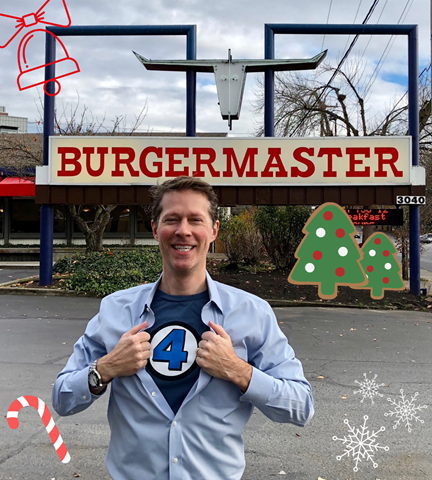
FIRST YEAR HIGHLIGHTS IN DISTRICT 4
At the close of such a difficult year, our office wanted to highlight some positive things. We share these with you in hopes of offering optimism. Wishing you all a peaceful and healthy holiday season and a 2021 that brings relief and joy!
Addressing Homelessness
Set up Regional Homelessness Authority. A year ago, I cast a key vote to support the Regional Homelessness Authority between King County and the City of Seattle. It is clear the status quo has not worked, and a regional response to this regional crisis is needed. In taking this groundbreaking step, we are honoring the research and advice of experts to end the fragmented approach we currently have. It is my hope that we will now unify in a holistic and aligned manner to achieve better results. Although the selection of a CEO to stand up the organization has been delayed by COVID, we look forward to action in 2021. In addition to establishing the RHA last year, the City budget we recently approved finally sets aside the funds to fulfill the City’s financial commitment to this new regional effort. CLICK HERE for a link to the legislation, CLICK HERE to see King County’s statement on this issue, and CLICK HERE for the website of the new Regional Homelessness Authority.
Funded a Tiny Home Village in the University District. Given the COVID-19 pandemic and the ongoing homelessness crisis, I agree that well-organized tiny house villages can be a cost-effective intervention in conjunction with case management and a performance-based contract with our City’s Human Services Department. We have seen a sharp rise in encampments in D4, done the legwork of finding a suitable short-term location for a Tiny House Village, and wish to move expeditiously to address this urgent concern of finding shelter and housing compliant with CDC guidelines. This new Tiny Home Village at NE 45th Street and Roosevelt Way NE will provide shelter (30 to 40 tiny homes) and case management for those experiencing homelessness there. The village will be temporary (1 to 2 years) until the COVID pandemic is completely behind us and the site is developed, most likely with affordable housing.
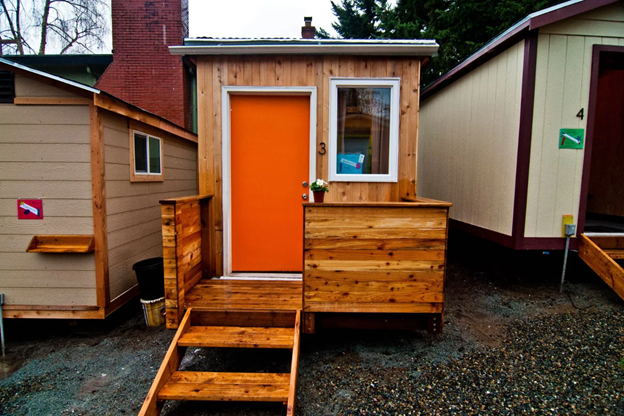
Photo from nonprofit Low Income Housing Institute
FYI: For 90 of the coldest days, the University of Washington will once again host “Tent City 3,” which will have shelter for between 40 and 70 people experiencing homelessness. The location is the southern edge of campus behind the Wallace Building at NE Pacific Street & Brooklyn Ave in parking lot W35. For more info from UW, visit their “Addressing Homelessness” website by CLICKING HERE.
Improved accountability for homelessness response. At a time when homelessness appears to be growing, a majority of my Council colleagues unfortunately used the budget to dismantle our city’s interdepartmental Navigation Team that engaged with unauthorized homeless encampments. Instead, I believe we should have allocated more resources to our Human Services Department to track and evaluate the effectiveness of such changes. By a vote of 6 to 3, my colleagues accepted my proposal to require at least some tracking of results of their new model of outreach to homeless encampments. I firmly believe that we should always measure outcomes to make sure we are truly helping people.
Supporting District 4 Neighbors
Renewed the Business Improvement Area. This year the City Council unanimously approved the legislation which I co-sponsored to reauthorize the Business Improvement Area (BIA) in the University District, which is the heart of District 4. BIAs are positive, community-driven economic development tools that help keep neighborhood business districts clean and safe throughout our city. The legislation I crafted with the Mayor incorporates many key principles sought by smaller businesses, including better representation, good governance, and as well as a more formal focus on preserving existing shops and restaurants. During and after the COVID-19 pandemic, we need to give our small neighborhood businesses the support they need to thrive. For a link to the Council Bill 119779 and related docs, CLICK HERE. For a link to the map of the proposed BIA, CLICK HERE.
Preserved funds for sidewalk projects benefiting Magnuson Park. We preserved the vital funding to build and enhance sorely needed sidewalks and crosswalks to safely connect Magnuson Park to the surrounding communities along Sand Point Way NE and to the bus stops and Burke-Gilman Trail across from the park. These sidewalks and crosswalks are needed now to meet the goals of three city government initiatives: Vision Zero, our Pedestrian Master Plan, and our Safe Routes to School program helping to safely connect dozens of children to Sand Point Way elementary school. This is about safety for pedestrians, it’s about safety for cyclists, it’s about connecting 850 low-income and BIPOC Magnuson Park residents to their neighbors, and it’s about safely enhancing access to the regional asset that is Magnuson Park. Funded feasibility study for a new pool at Magnuson Community Center. We secured funding to study the feasibility of a new pool at Magnuson Community Center. Frankly, a new pool there might not be feasible, but the vision of hundreds of low-income kids who call Magnuson Park home taking swimming lessons within a city surrounded by water and having fun year-round in a pool they can walk to is too irresistible not to study the possibilities. Data reveal children of color have less access to parks and recreational programming that enhance self-confidence, maintain health, foster creative expression, and increase social and emotional bonds that strengthen community cohesion.
Funded pedestrian safety improvements on I-5 overpass to connect Wallingford with U District. There are only two east-west crossings of I-5 between 65th/Green Lake and North 40th Street: NE 45th and NE 50th Streets. Both are heavily traveled by cars, and 45th by many buses, pedestrians, and bicyclists. Both 45th and 50th are very difficult and dangerous for non-motorized users. As a result, the University and Wallingford communities have advocated for improvements for many years. Unfortunately, the bridge itself is a Washington State DOT asset, making it difficult for our Seattle DOT to implement fixes. Solving the problem has become more urgent as the new Sound Transit Link station in the U District prepares to open in 2021. SDOT completed some initial design work in coordination with WSDOT, but it lacked funding to implement. Community leaders and transportation safety advocates worked with my office to insert $400,000 into the 2021 budget, so that construction of the improvements on the I-5 overpass are possible now. To see the official budget action, CLICK HERE.
Supported additional funding for litter cleanup under the Mayor’s Clean City Initiative. CLICK HERE to read an overview of this $3 million dollar initiative to surge the clean-up of litter and illegal dumping. The City will stand up a rapid response team within Seattle Parks and Recreation to address trash in parks, and make infrastructure improvements in key parks to improve overall cleanliness. The proposal increases the purple bag program, the number of needle disposal boxes in the city and would expand the graffiti ranger program. Funding would also be directed to business districts throughout the city to increase contracted cleaning in their neighborhoods such as the University District. In addition, SPU would more than double the number of trash pickup routes which provide twice weekly collection of trash and bulky items in public rights of way which should greatly benefit District 4. I also took the simple, yet unprecedented step directly imploring the Washington State Department of Transportation (WSDOT) to pick up the trash along the I-5 greenways they own. WSDOT replied to say they will strive to do a better job to make their I-5 greenways cleaner.
Delivering COVID Relief
Supported funding for food vouchers, small business support, and rent relief. City Council and Mayor Durkan have been working to mitigate the economic impacts of the COVID pandemic. This work has included relief for people who could not access federal aid, food support, small business grants, internet and computer access, and assistance with rent, utilities, and other bills. CLICK HERE to learn more.
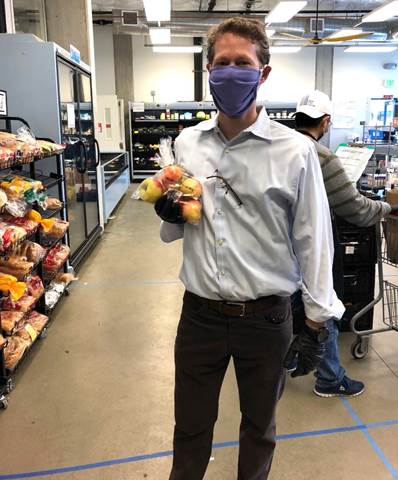
Reduced utility bills by removing COVID-era late fees. When the COVID pandemic struck early in the year and the economy went south, many utility customers have had difficulties keeping up with their bill payments. Working with both Seattle City Light and Seattle Public Utilities, I sponsored a bill to eliminate late fees and interest on both SCL and SPU bills during the crisis. The period of relief under that bill is expiring at the end of 2020, so I led the passage of another bill extending the relief at least through the first half of 2021 (or until the City/State emergency declarations are lifted). The first bill is HERE, and the new one is HERE.
More COVID relief: For more about specific COVID relief programs in Seattle, scroll down to the end of this newsletter for links to key city government and other helpful websites.
Prioritizing Equity
Initiated Action Plan for Internet for All. We reaffirmed our commitment to our ambitious Internet for All initiative in the budget document to increase accountability to follow through on the Internet for All Action Plan’s eight strategies. The next report from Seattle’s Information Technology Department to my Transportation & Utilities Committee will be in the first quarter of 2021. The report will summarize progress to increase access and adoption of affordable and reliable internet service, including setting up accountability dashboards to track results.
Requested new relief program for small businesses impacted by transportation construction. During this year’s budget process, in order to address concerns of businesses in the U District and other neighborhood business districts, I advanced a “Statement of Legislative Intent” to have the Office of Economic Development (OED) collaborate with the Seattle Department of Transportation (SDOT) to propose a strategy for funding and distributing financial assistance to small businesses that are adversely impacted during the construction of City-led transportation projects. This is easier said than done due to constraints of State law, but it’s important to pursue this because vulnerable small businesses are too often impacted by our government’s own construction projects.
Required improved data collection to prevent economic displacement. When adopting major new land use changes or moving ahead with new construction projects, we need to ensure we have a detailed and accurate system to track the potential loss or demolition of existing naturally occurring affordable housing—and the displacement of low-income households. The data on displacement of low-income households needs to include rent levels and supply of naturally occurring affordable housing. We need to better understand the NET impacts. This information will enable us to better quantify our new and existing stock of affordable housing. The Council included in the 2021 budget my request that the City actually obtain the data we need to implement Resolution 31870, section 2.G. and Executive Order 2019.02. Getting this information will provide a more comprehensive picture of our City’s affordable housing stock, so that we can do more to prevent economic displacement in Seattle. To read the official budget action, CLICK HERE.
Introduced and passed Justice for George Floyd Act Resolution to support police reform at the federal level, too. Despite disagreements on various public safety issues, City Council unanimously passed my Resolution 31963 which I drafted to voice our support for the national legislation entitled “The George Floyd Justice in Policing Act.” That federal bill is H.R. 7120, introduced by Congresswoman Karen Bass, Democrat from California and supported by Seattle’s congressional delegation Pramila Jayapal and Adam Smith. It passed the U.S. House of Representatives but has yet to advance in the U.S. Senate. This federal bill addresses many concerns raised by protesters that are authorized by federal law, such as the need to restrict qualified immunity for police officers across the nation.
Getting Back to Basics
Requested analysis of City Government Employees’ Retirement System expenses. While we want city government employees to have access to retirement benefits from a sustainable retirement system, my concern is that Seattle taxpayers continue to pay an increasing amount to support the pension program of our City government employees. My colleagues agreed to my budget request to have the city government clearly quantify and shine a light on these expenses paid by Seattle’s taxpayers, so that the general public and media are more aware of these costs and the upward trend. We want a sustainable retirement system for our employees. At the same time, we are conscious that every extra dollar paid by City taxpayers to support a government employee lifetime pension is a dollar not provided for other urgent needs, such as housing those experiencing homelessness. While we cannot change current pensions, we may want to consider providing more sustainable retirement options for FUTURE new city government employees, so that these retirement programs available only to government employees do not unnecessarily drain money from external-facing programs serving our city’s most vulnerable populations and communities. The next generation of younger, new employees who have a more mobile and versatile career path might appreciate other options that do not rely on decades of local government service to provide the most retirement benefits.
Obtained funding for transportation priorities from Vehicle License Fees. After the Supreme Court overturned Tim Eyman’s Initiative 976 as unconstitutional, the City of Seattle is able to tap again the vehicle license fees (VLF) as a source for transportation projects and programs, including bridge maintenance. Currently we pay $80 to the City and that was going to drop to only $20 because a $60 VLF approved by voters in 2014 is expiring. As allowed by State law, the Council adjusted it to $40. That incremental $20 VLF will raise $3.6 million in 2021 and $7.6 million per year when there is a full year of funding starting in 2022. We could have immediately dedicated the funds for bridge maintenance (see article below), but a majority of the Council decided to do a public process to decide how to spend the revenue; described in the legislation HERE (last two “Whereas” clauses). Despite the disappointing delay, I am hopeful the additional process will lead to a robust increase in funding for bridge safety from several sources, which was called for by the audit of bridges I initiated and would benefit all modes of travel and keep our economy moving. For a Seattle Times article explaining the renewed VLF fee, CLICK HERE.
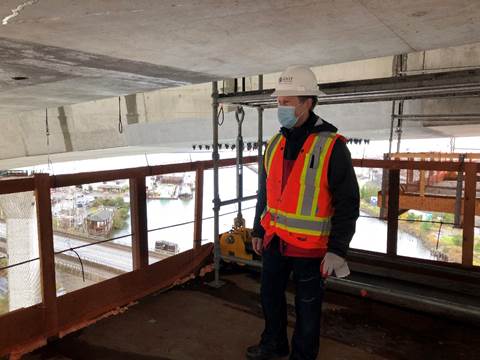 Councilmember Pedersen inspecting underneath West Seattle Bridge
Councilmember Pedersen inspecting underneath West Seattle Bridge
Initiated safety audit of Seattle’s bridges and secured additional funding for bridge maintenance. After the Mayor had to close the West Seattle Bridge suddenly in March, I initiated an audit by the City Auditor to review the status of the bridges across Seattle and their ongoing maintenance needs. The audit report concluded that the City should be spending at least $34 million per year on bridge maintenance, but spent about $10 million in 2020 and less in earlier years. This underspending results in deterioration of the City’s infrastructure over time. As I had requested, this audit was delivered to the Council in time to inform the 2021 budget. I worked hard on a number of fronts to increase the City’s commitment to bridge monitoring and maintenance, and succeeded in raising the 2021 figure to about $14 million. While that’s a step in the right direction, we need a larger and longer source of stable revenue. Frankly, I’m disappointed that some of my colleagues did not use this budget as an opportunity to take infrastructure safety more seriously by providing more dollars. My blog posts discussing the bridge audit and related budget items are HERE and HERE. For an editorial by the Seattle Times on this topic, CLICK HERE.
Protecting our Environment
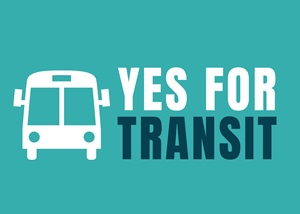
Renewed Transportation Benefit District for transit. We are thankful to Seattle voters for approving Seattle Proposition 1 in November 2020 to authorize a six-year 0.15% sales tax for the Seattle Transportation Benefit District (STBD), which focuses on supplementing the bus service from King County Metro as well as providing free transit passes for those most in need. Exactly how to spend renewed STBD funds as well as other transportation infrastructure dollars in 2021 will be a major topic for discussion in my Transportation & Utilities Committee — and for many Seattle residents.
Crafted Climate Note policy to consider climate change and resiliency with new legislation. The Seattle City Council unanimously approved Resolution 31933, which I crafted. The Resolution will, for the first time, require the City Council to formally consider the crisis of climate change when reviewing new legislation. For more about climate change and the new Biden Administration, see below.
Prodded bureaucracy to speed protections of trees. Washington is the “Evergreen State” and Seattle is the “Emerald City.” Trees provide numerous benefits including carbon sequestration, absorption of rainwater to reduce harmful runoff into Puget Sound and Lake Washington, shade for cooling during the warmer months, and proven health benefits. The bigger the tree, the better. As we take a long overdue, serious look at racial injustice issues, we know some communities of color have fewer large trees and are having them removed more often. As far back as 2009, our City Auditor determined that fractionalized management of trees and urban forestry issues was a major problem for the City of Seattle and recommended consolidation. Instead, the City for eleven years has continued to try to make a multi-departmental approach to tree management work. As it has boomed with development, Seattle has struggled to prevent continued loss of significant numbers of large trees and reduced tree canopy area. It’s oversight to protect trees is not only fractured, but weak. I proposed two budget provisions to improve Seattle’s management of its urban forest resources: A budget proviso to withhold funds from the Seattle Department of Construction and Inspections (SDCI) if it didn’t deliver an updated tree ordinance to the City Council by mid-2021 under Resolution 31902, and a request for a report (HERE): “the Executive, Urban Forestry Commission (UFC), and Urban Forestry Interdepartmental Team [shall] evaluate models for consolidating the City’s urban forest management functions and, based on this evaluation, make recommendations on how changes could be implemented.” Unfortunately, my colleagues did not support my tough proviso, but the Executive is aware that the public and councilmembers are impatient and will be demanding action in 2021. Fortunately, the requirement for strategies to better manage our urban forest passed and will delivered to Council by September 15, 2021. My staff and I will be carefully monitoring the City’s implementation of these important quality of life and equity items.
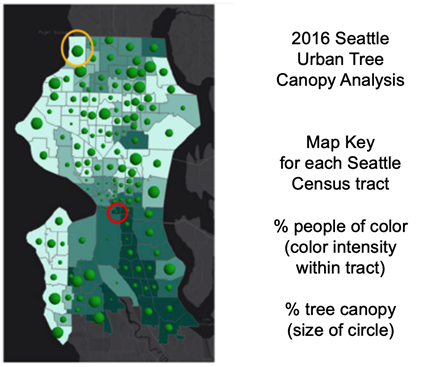
Source: Seattle’s Urban Forestry Commission
2020 IN D4
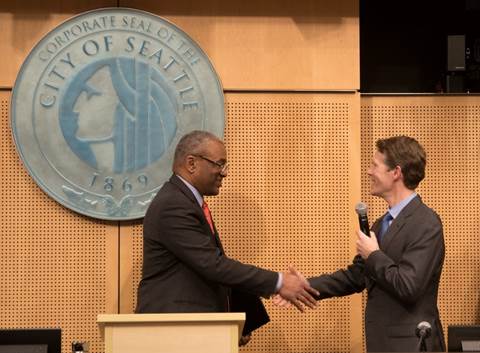
January: sworn into office as your City Councilmember by a public servant hero, Ron Sims
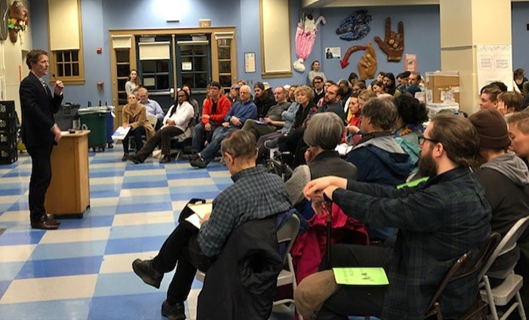
January: Eastlake Town Hall
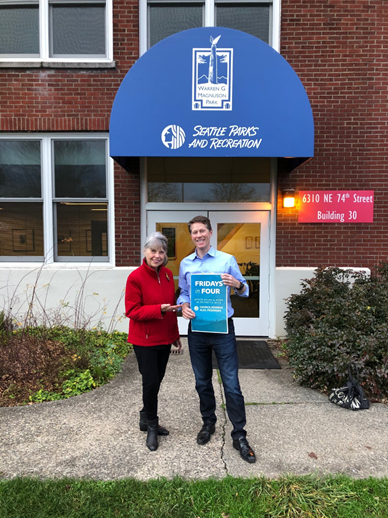
January: Kicking off weekly Office Hours at Magnuson Park
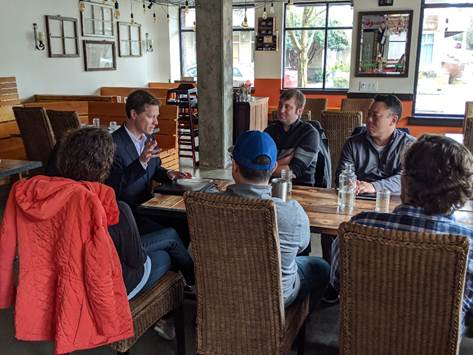
February: District 4 Restaurant Roundtable
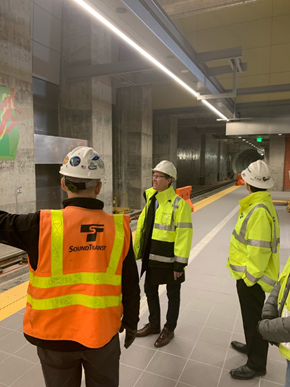
February: Touring the new Roosevelt Light Rail Station
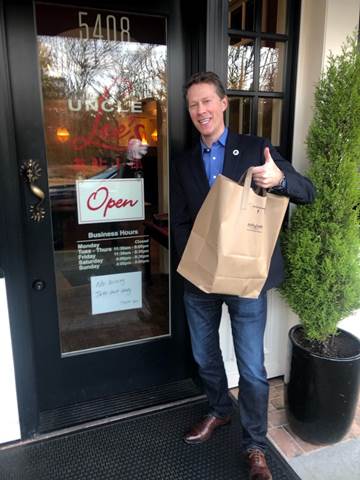
March: Supporting local business with take-out in our district as pandemic led to restrictions on indoor dining
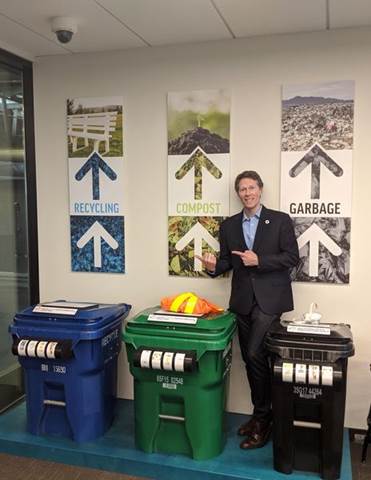
April 2020 Earth Day: touring Transfer Station in Wallingford, as Chair of Transportation & Utilities Committee
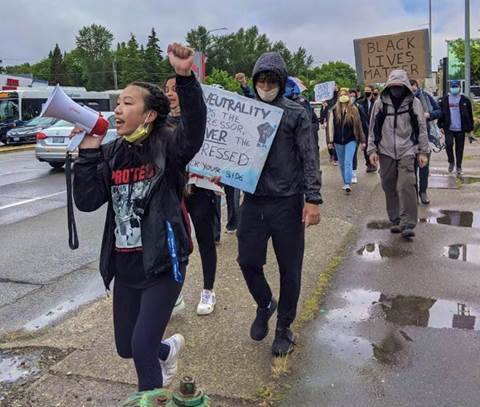
May: visiting Murphy’s Pub in Wallingford and other small businesses to listen to what they need (and to get a growler).
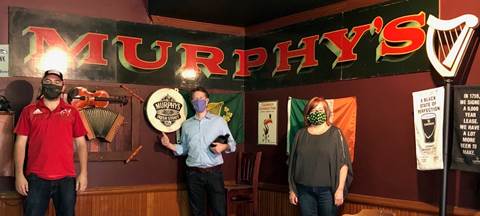
May: joining an early peaceful march in North Seattle with Nathan Hale students, shortly after Minneapolis police murdered George Floyd.
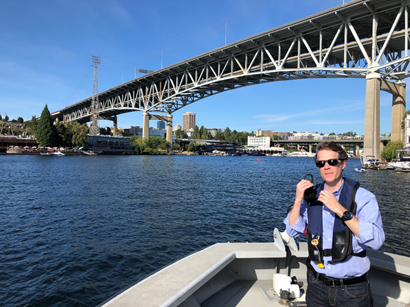
August: On a ride-along with Harbor Patrol to see District 4 and its bridges from Lake Union and Lake Washington
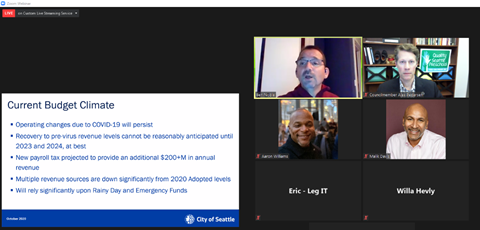
October: another D4 Town Hall; this one focused on our City budget
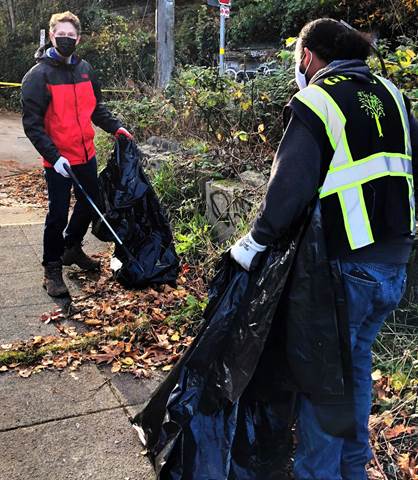
November: Picking up litter in our district with Seattle Public Utilities employees
REVAMPING PUBLIC SAFETY
The budget, as amended by the City Council, unfortunately cuts police officer positions drastically before there is a community-driven plan and proven alternatives in place. While the Council approved my request to study the impact on response times to 9-1-1 priority one emergency calls, this will be after-the-fact, instead of careful upfront planning. I strongly support more police reform and proven alternatives to traditional policing such as sending mental health professionals to help people in mental health crisis. But we need the plans in place first. And how City Hall allocates your tax dollars must be done effectively. Even after a Seattle Times analysis indicated our police department has fewer officers per capita than other cities — and after we learned highly trained officers are leaving at a faster rate — my Council colleagues chose to permanently eliminate police officer positions without first finishing the formal community input processes created by the Council and Mayor. The budget also sidesteps the real issue: the urgent need to revamp the unjust, inflexible, and expensive police union contract. Redoing that contract is how we can save money, improve discipline, honor good work of first responders, and deploy unarmed professionals for lower priority calls to reduce harm. “Police contracts are one of the keys to police reform,” said Community Police Commission Co-Chair, Reverend Aaron Williams, at my Budget Town Hall. “When you’re talking about changing anything from the discipline of officers to them receiving pay, it all comes back to contracts.” Moreover, expanding accountability reforms requires ample staffing for supervision and community policing. Yet Council’s amendments cement in a sharp reduction in officers before proven alternatives are in place. I’m concerned the remaining officers will be stretched thin and responding late. Our former Police Chief Carmen Best was clear: “I do not believe we should ask the people of Seattle to test out a theory, crime goes away if police go away, that is completely reckless.”
Concerns With Controversial Proposal to Add Defenses for Misdemeanor Crimes
I agree that reimagining public safety should include preventing crime, increasing police accountability, and investing more in community health and wellness. We have made more progress and there is much more work to be done. It also remains the responsibility of policymakers to strike an appropriate balance by assessing whether any proposed policy that is unconventional and untested may, in fact, be unwise and make matters worse.
At this time, I have ten specific concerns regarding my colleague’s proposal to amend our Seattle Municipal Code to add defenses found nowhere else in the nation for those who have committed misdemeanor crimes:
- It’s important to have local laws that foster respect among each other, rather than enabling individuals committing crimes to sidestep codes of conduct and avoid consequences for breaking basic laws that set standards for how we interact with each other. I’m concerned that minimizing consequences for breaking our laws will not make our communities safer. While it has made sense to reform laws such as drug possession meant to protect oneself, I’m concerned about weakening laws meant to protect each other and our communities. This proposal seems to create too easy of an excuse for repeated vandalism, trespassing, shoplifting, and other crimes that harm other people.
- Let’s first see effects of other big changes: I believe we should wait until we can see the impacts of the recent cuts to the police budget as well as the results of the community-led participatory budgeting process next year, the implementation of alternatives to traditional policing, and the revamping of the police contract to finally put in place the missing reforms. Let’s first see how these other changes work before this Council is immersed in a time-consuming and distracting debate over whether we should be the first city in the U.S. to weaken basic local laws that protect each other. Once again, it seems we would be unwisely proceeding with a controversial proposal without a plan.
- Negative impact beyond Seattle: As with the unfortunate incident called C.H.O.P. where Seattle became, in the eyes of many, a national embarrassment, I’m deeply concerned that such a controversial proposal could have a negative impact that reverberates beyond the bubble of City Hall and the boundaries of our city. It could inadvertently impede police reform efforts we want enacted at the state level in Olympia early next year…The Seattle Times recently quoted the concern of State Rep. Roger Goodman, a Kirkland Democrat who chairs the House Public Safety Committee: “Those who are alarmed by this can use this as a talking point to undermine what I believe are responsible justice system reforms on the state level.”
- Ignores victims of crimes: The December 7 memo from Central Staff does not discuss any impact to the victims of the crimes, including physical, emotional, or economic harm to the victims.
- Ignores input from the general public: We often say proposed legislation must have stakeholder input and, in this case, I strongly believe the general public and small businesses are key stakeholders. While advocates might have the ear of some Councilmembers and offer some commendable ideas, we also need to listen to the general public and small businesses, which is harder to do as communications are limited during the COVID pandemic. Our city cannot afford to have more local businesses leave our city and shrink the tax base we rely on to fund programs to help our low-income neighbors.
- Could increase insurance premiums: The December 7 memo from Central Staff does not discuss the cost borne by renters, homeowners, and small businesses to replace stolen merchandise or broken windows or increased insurance expenses. I’m concerned this could give insurance companies an excuse to classify all of Seattle as a high-risk zone which will, in turn, increase the cost of renters insurance, homeowners insurance, and business loss insurance.
- The December 7 memo from Central Staff does not say whether any other U.S. cities have experimented with expanding affirmative defenses to misdemeanor crimes. If other cities are doing this, can we review the data of how it actually works elsewhere? If no other U.S. cities are experimenting with this, why should our communities and small businesses in Seattle once again be the national guinea pig?
- Would this apply just to Seattle residents? If not, how would this proposal prevent those struggling throughout the region from simply driving into Seattle to shoplift because they know they can claim poverty as a defense?
- Not needed now: This proposal is not needed for at least 1 to 5 years because the existing City Attorney who is likely seeking another 4-year term next year has already acknowledged in his October 30th memo that he does not prosecute so-called crimes of poverty.
- “Necessity” defense already available: The proposal is not needed because, as the City Attorney already points out in his October 30th memo, defendants can already use the common law defense of “necessity.”
For more on this topic, you can visit my blog post by CLICKING HERE.
COVID RESPONSE AND RELIEF
The Washington State Department of Health and Public Health – Seattle & King County are working to distribute COVID-19 vaccines in our region. Vaccination is currently only available to people in the highest risk groups (such as frontline health care workers), and will become available to more people in 2021 as King County receives more supplies. CLICK HERE to learn more about the vaccine. As people begin to receive vaccines, the rate of new cases in King County is still very high and it remains crucial to social distance, avoid gatherings, and wear a mask.
If you have symptoms or learn that you have been exposed to someone with COVID-19, health official recommend that you get tested immediately.
- Testing is available in North Seattle on Aurora Avenue (register HERE), Neighborcare Health (call 206-296-4990), and Northgate Community Center (register HERE)
- Free at-home testing by mail is also available—register HERE.
- Click THIS LINK to see other testing locations in Seattle and King County.
Mayor Durkan and City Council have extended COVID-19 relief efforts.
- The eviction moratorium for residential, nonprofits, and small businesses will remain in place through March 31, 2021.
- Late fees on utilities bills remain suspended.
- A pilot program to lower Seattle Public Utilities and Seattle City Light bills by up to 60 percent will continue operating through June 30, 2021.
- Enforcement of the 72-hour parking rule remains suspended.
- Temporary loading zones for restaurants and small businesses have been extended.
King County, the Seattle Metropolitan Chamber of Commerce, and Greater Seattle Partners are administering a survey of small businesses to understand the economic impacts of the pandemic. If you are a small business owner, nonprofit representative, or independent worker, CLICK HERE to take the Business Impacts Survey before December 23.
CLICK HERE to read more about Seattle’s ongoing response to the public health and economic crises.
TRANSPORTATION AND CLIMATE CHANGE
Is the climate cavalry coming?

Seattle is not about to let up on its efforts to address climate change, which currently include reducing carbon emissions and increasing our resiliency (“adaptation”) in the face of the negative environmental changes already underway. But as the Chair of the Council’s Transportation & Utilities Committee, I can tell you it’s a relief that a new federal administration is entering that clearly embraces the science, the national and international efforts required to reverse the global threat, and the environmental and economic benefits of transitioning to a more green economy. This includes President-Elect Biden’s appointments to the U.S. Dept of Transportation, the Dept of Energy, and a new cabinet-level climate advisor. I believe the climate calvary is coming.
I’m also more hopeful with the Biden Administration and their experience with the U.S. Senate that we could see more funding for infrastructure which would benefit our efforts to repair or replace Seattle’s aging bridges – bridge that we must keep safe and open to support other investments in several modes of transportation, including public mass transit.
WE WANT TO HEAR FROM YOU
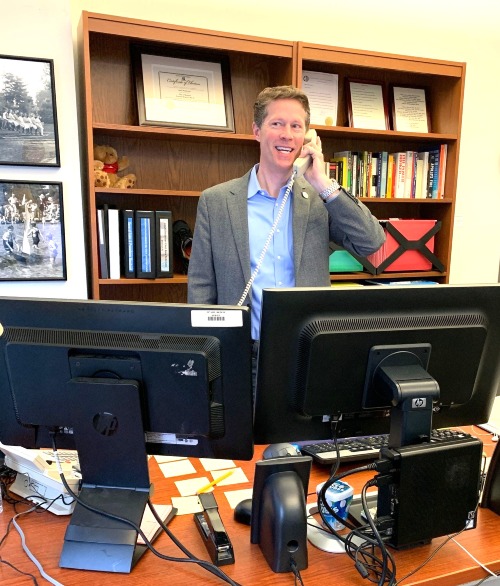
City Council Meetings on the Internet
Listening: Even though City Council is not currently holding meetings in person in order to follow public health guidelines, you can still follow along by listening on your computer or phone by CLICKING HERE. You can also listen on your phone by calling 253-215-8782.
Commenting: You can also submit public comment by sending an e-mail to me at Alex.Pedersen@seattle.gov or to all 9 Councilmembers at council@seattle.gov. Please remember to add “For City Council Meeting” in the comments. Now you can also phone into the meeting to speak directly to the Council live. For the instructions on how to register and call in, CLICK HERE. Sign up begins two hours prior to the meeting start time.
Virtual Meetings with Your Councilmember Pedersen
I continue to schedule virtual in-district office hours, so we can chat by telephone or via Skype. Please continue to sign up through my website or by CLICKING HERE so I can hear your ideas, concerns, and requests. You can also just send an e-mail toalex.pedersen@seattle.gov
For previous e-newsletters, visit my blog by CLICKING HERE.
We will get through this together, Seattle.
With gratitude,

Councilmember Alex Pedersen
Seattle City Council, District 4
Email: Alex.Pedersen@seattle.gov
Find It, Fix It
Posted: December 18th, 2020 under Councilmember Pedersen

